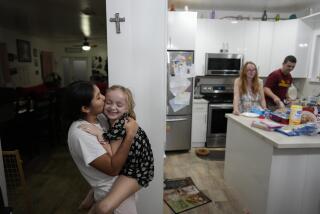Boys From Brazil Try to Find Their Roots
- Share via
RIO DE JANEIRO — Charlie Prengaman was a baby when he was plucked from a Brazilian slum and adopted by an American family. He never knew his birth mother, can’t speak Portuguese and doesn’t remember a thing about Brazil.
But growing up in Eugene, Ore., he felt Brazil in his blood.
For one, there was his skill at soccer, the sports passion of many Brazilians. Charlie was a standout player at Churchill High School, leading its soccer team to the playoffs for the first time in 26 years.
“I definitely think it’s genetic -- like in basketball, you have this thing called court awareness,” said Charlie, 18. “I have the same thing on the soccer field; I know what’s going on all around me all the time.”
He said he also sensed his Brazilian-ness in the stares directed at him and his 17-year-old brother, Jamie, who also was adopted in Brazil, when they went out in public with their American mother. The two boys are black and their mother, Ann Marie, is white with red hair.
A few weeks ago, Charlie and Jamie returned to search for their roots in Recife, the city in northeastern Brazil where they were born. It was a strange, but moving homecoming.
When the media heard that the two were looking for their birth mothers, they were invited on a television show in Recife, a city of 1.4 million people 1,150 miles north of Rio de Janeiro.
In the TV studio, Charlie and Jamie seemed to fit right in with the mostly teenage audience. But because don’t speak Portuguese, they couldn’t understand a word that was said.
The audience was puzzled when Peter, the biological son of the boys’ adoptive mother, took the microphone and said in Portuguese that he was their brother. Peter, 27, studied Portuguese at Stanford to help Jamie and Charlie in their search.
The TV appearance didn’t produce any clues about the origins of Charlie and Jamie, and trips to the orphanage where the boys were adopted and the adoption court also provided no help. But Charlie said they took it in stride.
“It’s like having a 100-piece puzzle and missing three pieces. I’m still missing two pieces -- my mom and dad -- but I found one piece by coming here,” Charlie said.
The visit to the orphanage also gave Charlie and Jamie a taste of the hard poverty that afflicts about a third of Brazil’s 175 million people, and made both keenly aware of the good fortune that allowed them to escape.
Still, the trip awakened a sense of pride, and both said they’d like to return to Brazil someday.
“I feel safer here than in the States because we look like Brazilians,” Charlie said. “In the States, everyone thinks I’m a thug. Here, it’s bad to look like an American because everybody points at you. I’m so glad to have this skin color.”
The best thing about the trip, Jamie said, was “seeing people who look like me.”
But the boys also noticed the subtle racism that permeates Brazilian society, although the problem is widely ignored or denied.
“If we go into a restaurant here, people will welcome Mom and Peter and then look at us and ask what we want,” Jamie said.
Race was an issue in the boys’ adoption.
“When I came to adopt them, they said maybe you want to look at others because there might be discrimination in the U.S.,” their mother said about the orphanage.
She said she was surprised to be asked similar questions by the tall, white, English-speaking juvenile court judge who oversaw the adoption in 1986.
“I told him that in fact the U.S. had become much, much better,” she said. “They are inheriting a world that is much better than when I grew up in Pittsburgh, when I never saw a black businessman, a black doctor. That’s all changed.”
There have been changes in Brazil too, she added. Recife today is very different from the city she visited in 1985.
“Recife is much more prosperous and built up, which is great for Brazilians,” she said. “But I felt a minor note of sadness in that Jamie and Charlie couldn’t see the city that led their parents to give them up.”
More to Read
Sign up for Essential California
The most important California stories and recommendations in your inbox every morning.
You may occasionally receive promotional content from the Los Angeles Times.













